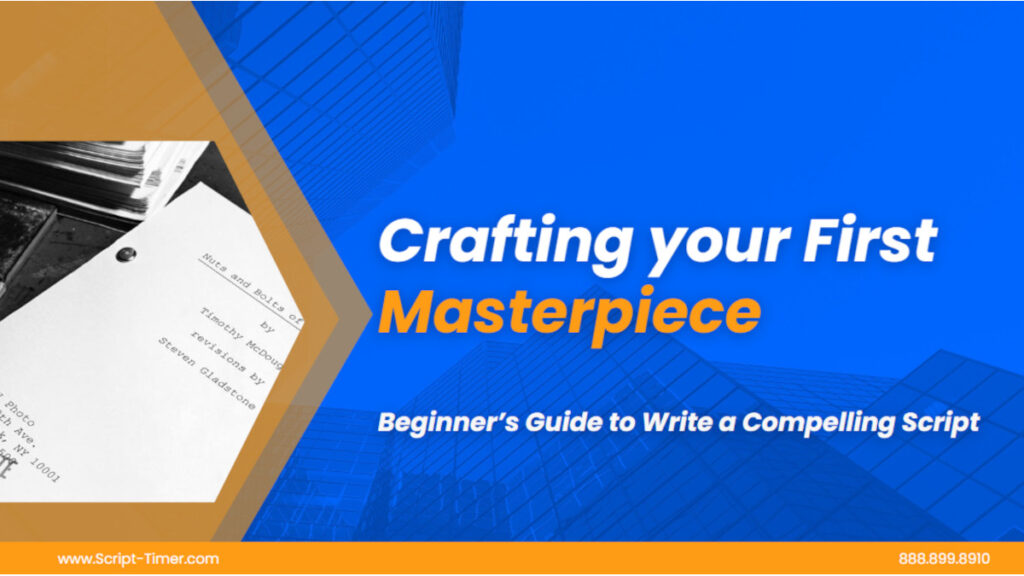Getting into the journey of writing a high-quality movie script is an exciting adventure, but when you are a beginner navigating the world of script writing, it might seem daunting to you at first, but don’t worry, writer! This guide offers you the fundamental steps to help you create your next masterpiece and turn your vision into a captivating film.
Writing a screenplay for a film is an exciting but pretty daunting adventure, especially if you’re a beginner. From the invention of exhilarating characters to coming up with a thrilling plot, so much has to be drawn as it is to illustrate your story onto the screen. Now, in this article, you will find the necessary pieces of advice, script tools and techniques; typical features of any beginner’s guide, which will help you stay afloat, drawing the best screenplay that will truly enchant its spectatorship and remain firmly fixed in people’s memory for good.
1. It starts with Your Idea:
All top films start with a part of your life, another’s life, or a dreamed up life —maybe a single idea or something complex. Be it your conceptual approach, character, or setting, the story has to rivet the audience right from the beginning. Keep on brainstorming different ideas until one sticks with you and you can see its possibility for engaging with others.
2. Memorable Characters:
Great characters are what make a great movie script. Take all of the time you can to make these characters explicit, including exact defining features as well as motivations and internal conflicts. To the degree that it’s appropriate, also flesh out their backstory, desires, and weaknesses, all in addition to their interaction with one another and how they perceive their environment. The more vivid and complex your characters are, the more strongly their experience will be connected with your audience. Tools such as script calculator or speech timer can help you to do this in a more precise way.
3. Improve your Narrative:
A compelling plot is something essential in keeping the audience engaged from start to finish. Don’t forget to highlight the key events and turning points of your story, pay attention to the pacing, structure, and tension. Consider the three-act structure as a framework for your script, with a clear beginning, intriguing middle part, and a magnificent end. Don’t be afraid to take risks and explore unexpected twists and turns to keep your audience on the edge of their seats.
4. Emphasize your Visuals:
Since film is basically visual communication, show and tell. Bring you scenes to life with active images, dialogues, and actions all playing out their respective roles in telling the story, setting the audience in a realm of their own. Each and every shot in your scenes serves to upgrade its storytelling, and each shot moves the story further through visual cues and austere symbolism.
5. The Art of Good Dialogue:
Dialogue is a truth teller and what moves the story. Look for showing the essence and personality of your characters in each of their dialogues, write responses any given character might actually say. Next, don’t let your dialogue become exposition- heavy with exchanges that fell forced and unnatural, you can try out an AI script calculator or word to time to accomplish this, but do make sure to allow the subtext to enable the characters to breathe life into their relationships and motivations by doing what they are doing rather than telling them.
6. Have Fun Rewriting and Revising:
Writing a movie script, like most creative works, involves constant revision. Don’t be scared to write the script again. In fact, there doesn’t exist something like a script that has been written just once, the magic in a work like this is to iterate it constantly, and trust me there’s nothing more satisfactory that when you finally reach your desired quality in your script.. Don’t be afraid to revise the script again and have it reviewed by trusted readers or mentors, even if it is painful. Where possible, the plot should be capitalized, as should any opportunities to deepen the character, but try always to make your script the best possible.
7. Feedback and Revision:
Remember that no script is perfect on the first draft, it is a great idea to ask for feedback to trusted readers that can give you tips to improve your script, writing groups or even script consultants, also be open to constructive criticism and then use it to improve your script and your storytelling, and remember every successful writer always goes through multiple drafts before their work reaches the level desired.
8. Learn the Craft:
Finally, dive into the best screenwriting by reading the best movie script writers and the movies they’ve written. Learn from their techniques, structures, and devices as much as you can, apply them to your writings, and maybe it’s really worth considering taking a screenwriting workshop or a course, take notes and, put into practice the recommendations that were given in the class.
Keep in mind that writing a movie script is the journey, not the destination, it is important to enjoy the process, embrace the challenges you may encounter, and let your passion and creativity guide you. With dedication, perseverance, and all of these helpful tips, you can turn your vision into a captivating script ready to take over the world!
In summary, it takes a lot of patience and commitment with lots of willingness to learn and grow further as a convincing movie scriptwriter. It all starts with a great idea for characters who remain in the heads of the audience, which comes after you watch other movies, then an interesting storyline, and lastly, the mastering of the art of visual and dialogue storytelling. Remember that rewriting and revision are an essential part of the artistic process, so you should never stop learning the craft and looking for an opportunity to improve the skills associated with it. With strong determination and hard work, you can see your story on the screen and leave an everlasting impact on the audience. Try out our useful script writing tools to take your efficiency and script quality to the next level!





